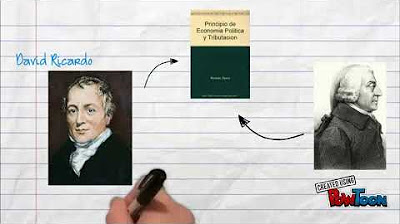Sejarah Pemikiran Ekonomi: Aliran PraKlasik #1
Summary
TLDRThe transcript explores the evolution of economic thought, highlighting key milestones like Adam Smith's 'Wealth of Nations' in 1776, and the debates around classical and pre-classical schools of thought. It delves into the development of economic theory from ancient Greek philosophers, scholasticism, mercantilism, to physiocracy, and how these ideas laid the foundation for later economic theories. The discussion also emphasizes how Adam Smith is often considered the 'Father of Economics' for turning economics into a positive science, free from philosophical or theological influence.
Takeaways
- 😀 The history of economic thought spans several schools, including pre-classical, classical, socialist, neoclassical, Keynesian, monetarist, and others.
- 😀 Adam Smith's book, *The Wealth of Nations* (1776), is often considered a milestone in economic thought, though his ideas were influenced by earlier thinkers.
- 😀 The term 'classical economics' was coined by Hendrik Mars, who, as an enemy of Adam Smith's thoughts, used it as a satirical label for Smith's ideas.
- 😀 Pre-classical thought existed before classical economics and includes ideas from ancient Greece, scholasticism, and the mercantilists.
- 😀 Ancient Greek thinkers like Plato and Aristotle contributed to early economic ideas, but their work was more philosophical than empirical economics.
- 😀 The scholastic period, which includes thinkers like Thomas Aquinas, blended economic theory with religious teachings and is not seen as 'pure' economics.
- 😀 Mercantilist thought focused on trade and wealth accumulation, with its proponents often being merchants or traders, which is distinct from later economic theories.
- 😀 The physiocratic school of thought, particularly prominent in France, focused on land and agriculture as the primary sources of wealth, influencing later economists like Smith.
- 😀 Adam Smith is recognized as the Father of Economics because he separated economics from philosophy and church teachings, making it a positive and empirical science.
- 😀 The pre-classical thinkers, although important, did not provide the same level of systematic economic theory as Smith, which is why he is considered a milestone in the development of economics.
Q & A
What is the central question being discussed in the video transcript?
-The central question discussed in the transcript is about the milestones of economic thought, specifically when the history of economic thought began and which figure or school should be considered as the starting point.
Why is Adam Smith often referred to as the 'Father of Economics'?
-Adam Smith is referred to as the 'Father of Economics' because his work in 'The Wealth of Nations' helped transform economic thought from speculative philosophy into a more empirical and positive science. His ideas on capitalism, including the concept of the 'invisible hand,' laid the foundation for modern economic theory.
What is the debate surrounding the start of economic thought in the transcript?
-The debate centers on whether economic thought began with Adam Smith in 1776, as commonly claimed, or whether earlier thinkers such as Plato, Aristotle, or even scholastic and mercantilist philosophers should be considered the true starting points of economic thought.
Why are pre-classical economic thinkers not considered the starting point of economic thought?
-Pre-classical thinkers like Plato, Aristotle, and scholastics are not considered the starting point because their ideas were more philosophical and tied to theology or natural science. Their work lacked the empirical, scientific approach that Adam Smith introduced to economic theory.
What role did Hendrik Marx play in the labeling of 'classical economics'?
-Hendrik Marx is credited with coining the term 'classical economics' as a kind of mockery or satire of Adam Smith's ideas. Marx's use of this term was a way to critique the economic system represented by Smith, thus giving Smith's work a label that eventually stuck.
How does the term 'classical' relate to Adam Smith’s economic theories?
-The term 'classical' was applied to Adam Smith’s ideas, but it was not a term Smith himself used. It was attributed to him later by critics, notably Hendrik Marx, who viewed Smith's ideas as outdated or 'old school' compared to later economic thought.
What is the significance of Adam Smith’s 'The Wealth of Nations' in the context of economic thought?
-'The Wealth of Nations' is significant because it marked the transition of economics from a philosophical and speculative field to a more empirical science. It introduced key concepts such as the invisible hand, division of labor, and market dynamics, which became foundational to modern economics.
Why is the term 'pre-classical' used in relation to earlier economic thoughts?
-The term 'pre-classical' refers to economic thought that existed before the classical economic theories of Adam Smith. It includes ideas from ancient Greece, the scholastics, and early economists like the mercantilists and physiocrats, whose thoughts influenced but did not fully form the modern understanding of economics.
What is the difference between classical and pre-classical economic thought?
-Classical economic thought, as introduced by Adam Smith, focuses on market dynamics, capitalism, and empirical science, while pre-classical thought, seen in figures like Plato and Aristotle, is more philosophical and intertwined with theology or speculative ideas rather than empirical research.
How did earlier philosophers like Plato and Aristotle influence Adam Smith’s work?
-Earlier philosophers like Plato and Aristotle contributed foundational ideas to economic thought, particularly in the areas of ethics, justice, and the role of the state in the economy. While their work was not 'economic' in the modern sense, their philosophical ideas were absorbed and reinterpreted by later thinkers like Adam Smith, who built upon them in a more systematic and empirical way.
Outlines

このセクションは有料ユーザー限定です。 アクセスするには、アップグレードをお願いします。
今すぐアップグレードMindmap

このセクションは有料ユーザー限定です。 アクセスするには、アップグレードをお願いします。
今すぐアップグレードKeywords

このセクションは有料ユーザー限定です。 アクセスするには、アップグレードをお願いします。
今すぐアップグレードHighlights

このセクションは有料ユーザー限定です。 アクセスするには、アップグレードをお願いします。
今すぐアップグレードTranscripts

このセクションは有料ユーザー限定です。 アクセスするには、アップグレードをお願いします。
今すぐアップグレード5.0 / 5 (0 votes)






